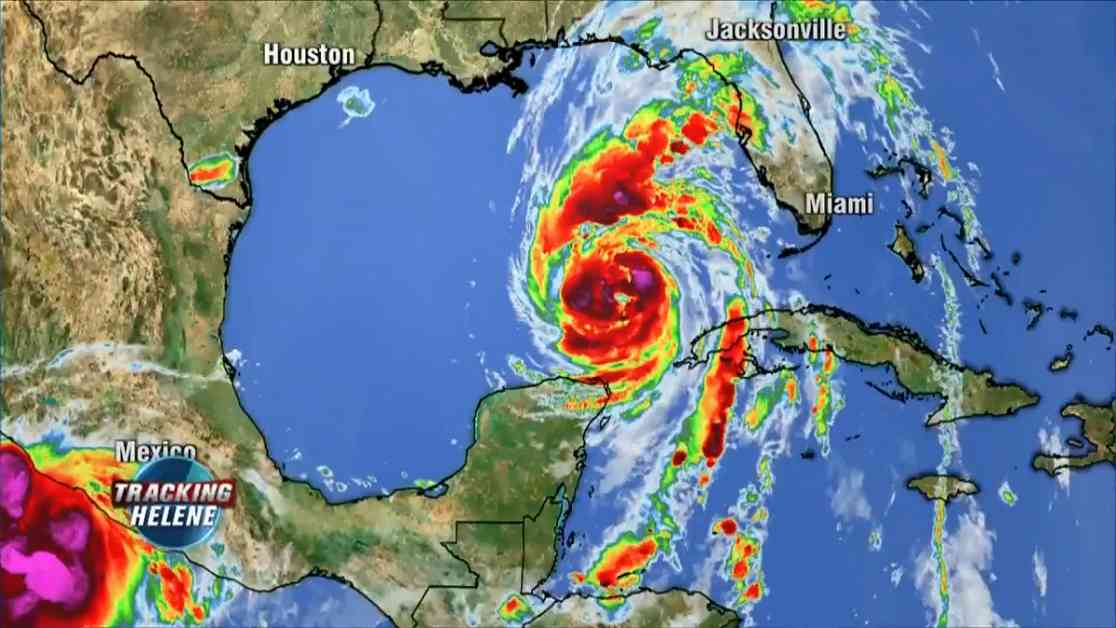Tropical Storm Helene Strengthens to Category 2 as it Heads Towards Florida – Latest Updates from WHDH 7News
TALLAHASSEE, Fla. (AP) — Tropical Storm Helene rapidly intensified on Thursday as it moved across the Gulf of Mexico towards Florida, posing a significant threat of an “unsurvivable” storm surge in northwestern parts of the state. The storm is also expected to bring damaging winds, heavy rains, and flash floods to much of the southeastern United States.
Helene was upgraded to a Category 2 hurricane on Thursday morning and is forecasted to become a major hurricane, reaching Category 3 or higher, by the time it makes landfall on Florida’s northwestern coast later in the evening. Hurricane warnings and flash flood warnings are in effect for areas extending far beyond the coast, reaching up into south-central Georgia. The governors of Florida, Georgia, and the Carolinas have all declared states of emergency in preparation for the storm’s impact.
According to Jack Beven, a senior hurricane specialist at the National Hurricane Center in Miami, Helene is expected to make landfall in the Big Bend region where Florida’s panhandle and peninsula meet. Beven emphasized the expansive reach of the storm, stating, “Regardless of how strong it is, it is a very large storm. It’s going to have impacts that cover a large area.”
The National Weather Service office in Tallahassee has forecasted storm surges of up to 20 feet in Florida’s Apalachee Bay, warning that they could be particularly catastrophic and unsurvivable. The office also highlighted the risks of high winds and heavy rains, urging residents to take evacuation orders seriously.
In preparation for the storm’s arrival, residents across Florida have been stocking up on essential supplies. Christine Nazworth in Crawfordville, located inland northwest of Apalachee Bay, shared her concerns as she prepared for the storm. “I’m prayed up,” she said. “Lord have mercy on us. And everybody else that might be in its path.” Despite a mandatory evacuation order in Wakulla County, Nazworth’s family plans to shelter in place.
School districts and universities along Florida’s Gulf Coast have canceled classes in anticipation of the storm. Helene, located about 320 miles southwest of Tampa on Thursday morning, is moving north-northeast with sustained winds of 100 mph. Forecasters predict that it will strengthen to a Category 3 or higher hurricane with winds exceeding 110 mph before landfall.
As Helene moves inland, it is expected to weaken but maintain strong, damaging winds that could penetrate well into the southeastern United States, including the southern Appalachian Mountains. The hurricane center has issued tropical storm warnings as far north as North Carolina, cautioning residents about the potential for prolonged power outages, fallen trees, and dangerous flooding.
The impact of Hurricane Helene is projected to be widespread, with areas 100 miles north of the Georgia-Florida line likely experiencing hurricane conditions. Georgia’s public school districts and universities have already canceled classes in anticipation of the storm. Meteorology professor Marshall Shepherd from the University of Georgia warned that Atlanta could face its worst strike from a major Southern inland city in 35 years.
Due to Helene’s size and strength, landslides are possible in southern Appalachia, and rainfall is expected to reach as far as Tennessee, Kentucky, and Indiana. Federal authorities have positioned resources such as generators, food, water, search-and-rescue teams, and power restoration teams to assist in the aftermath of the storm.
In addition to Helene, Tropical Storm Isaac has formed in the Atlantic and is projected to strengthen as it moves eastward across the open ocean. Isaac could become a hurricane by the end of the week, potentially affecting Bermuda and the Azores. Meanwhile, former Hurricane John reformed as a tropical storm in the Pacific and is strengthening as it threatens Mexico’s western coast.
As the Atlantic hurricane season continues, residents in the affected regions are urged to stay informed and follow safety precautions. The National Oceanic and Atmospheric Administration has predicted an above-average hurricane season this year due to record-warm ocean temperatures. Stay updated on the latest developments and be prepared for any potential impacts from these powerful storms.


